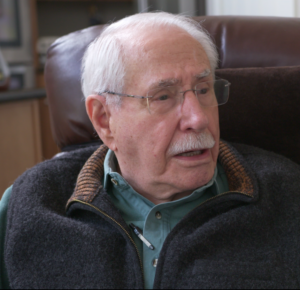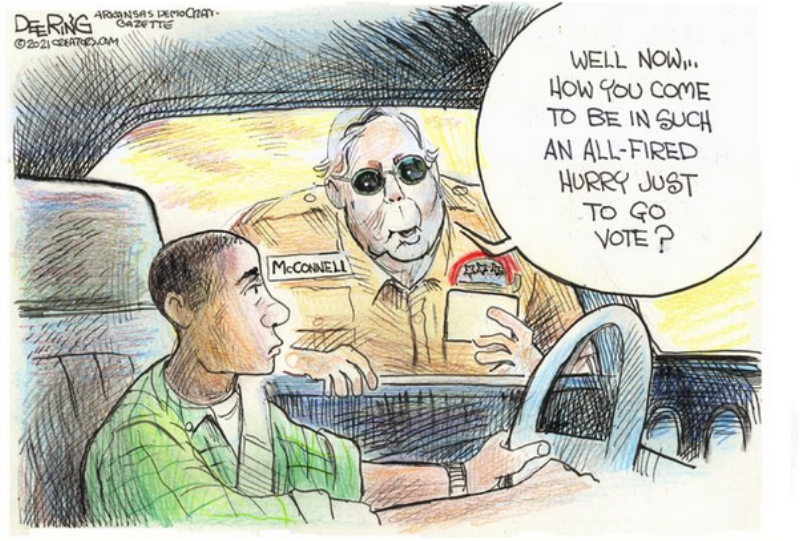TMC for ek hornbeck
Jul 01 2021
Cartnoon
Jul 01 2021
The Breakfast Club (Vanity)
Welcome to The Breakfast Club! We’re a disorganized group of rebel lefties who hang out and chat if and when we’re not too hungover we’ve been bailed out we’re not too exhausted from last night’s (CENSORED) the caffeine kicks in. Join us every weekday morning at 9am (ET) and weekend morning at 10:00am (ET) (or whenever we get around to it) to talk about current news and our boring lives and to make fun of LaEscapee! If we are ever running late, it’s PhilJD’s fault.

This Day in History
The Civil War Battle of Gettysburg begins; The first nuclear weapons test in peacetime; TR’s assault on San Juan Hill; Britain’s Princess Diana born; Hong Kong returned to China; Actor Marlon Brando dies.
Breakfast Tunes
Something to Think about over Coffee Prozac
Vanity is the quicksand of reason.
Jun 30 2021
Cartnoon
On June 30, 1900 what was described as “a slight blaze in a bale of cotton” quickly spread into a disaster that newspapers branded the “Hoboken Horror.” The great Hoboken Docks Fire killed hundreds, destroyed millions of dollars in property, and demonstrated risks of the era of great ocean liners.
The 1900 Hoboken Docks fire occurred on June 30, 1900, and killed at least 326 persons in and around the Hoboken, New Jersey piers of the Norddeutscher Lloyd (NDL) shipping company. The piers were located in New York Harbor, at the foot of 3rd and 4th Streets in Hoboken, across the North River (Hudson River) from Manhattan in New York City. The area, a few blocks north of Hoboken Terminal, is now mostly part of the Hudson River, without docks; a waterfront bicycle path lines it.[2] There is, however, a “Pier C Park” on the northern side of the disaster area, which juts out into the water.
The fire began when cotton bales stored on NDL’s southernmost wharf caught fire, and winds carried the flames to nearby barrels of volatile liquids, such as turpentine and oil, which exploded in rapid succession. It burned NDL’s Hoboken piers to the waterline, consumed or gutted nearby warehouses, gutted three of NDL’s major transatlantic liners, and damaged or destroyed nearly two dozen smaller craft. Most of the victims were seamen and other workers, but included women visiting one of the ships.
Many of the deaths occurred as the flames reached several of NDL’s transatlantic steamships docked at the piers, including the Saale, Main, and Bremen. These ocean liners, which caught fire while their coal-fired steam engines were cold, became deathtraps for dozens of seamen and visitors who were unable to reach safety on deck, squeeze through portholes, or otherwise escape.
Saale was gutted, with the highest death toll. After she became engulfed in flames, her mooring lines were cut, leaving her to drift as fire reached those further below deck. Finally towed after she drifted toward New York piers, she settled in the Jersey flats near Liberty Island. Her death toll included her captain (August Johann Mirow), and members (primarily women) of a group known as Christian Endeavor, who were visiting the ship before the fire started.
Main was furthest from the fire’s starting point, but was soon engulfed with fire. She was unable to get loose from her moorings for more than seven hours, until the fire was nearly over. Damaged nearly beyond repair, Main was ultimately towed to Weehawken, New Jersey, where she was beached. Amazingly, 16 coal trimmers who had survived the fire hiding in a coal bunker then crawled out of the hulk. Two days after the fire began, the red-hot ship continued to smolder and smoke, which further delayed rescue and recovery efforts.
Bremen also burned intensely. After her crew threw off her mooring lines, she drifted until she was towed to mid-stream by tugs. She eventually ran aground upriver near Weehawken. More than 200 people were on board when the fire began, including visitors. Initial reports indicated that all managed to leave the ship, but many jumped and may not have reached shore.
Many who died in the fires were interred at the Flower Hill Cemetery, North Bergen.
The holder of the Blue Riband at the time of the fire. NDL’s Kaiser Wilhelm der Grosse was also docked in the company’s Hoboken piers, but fared better than its sister ships. She was the first of the steamers that tugs tried to pull away from the pier (15 minutes after the fire began). Although she was afire at several places, fireboats soon put out those fires, and in the end she suffered little serious damage.
The fire erupted on a Saturday that was considered a “half-holiday” when no departures were scheduled. Had any of the ships been ready to sail, the loss of life and property would have been much greater.
The fire also destroyed several Campbell Stores warehouses, built by the Hoboken Land & Improvement Company, the nearby piers of the Scandinavian America Line and a railroad shed. According to The New York Times, the railroad shed belonged to West Shore Railroad, although it was more likely a shed of Hoboken Shore Railroad (which connected the West Shore Railroad’s lines at the Weehawken Terminal to the Hoboken docks). A shed of Hamburg America Line was partly chopped down during the fire by the fire service to avoid spreading of the fire to the Hamburg America Line piers. The total value of property losses due to the fire was estimated (the morning after the fire) at $6.175 million, and (the following year) at $5.35 million.
TMC for ek hornbeck
Jun 30 2021
The Breakfast Club (Coffee Break)
Welcome to The Breakfast Club! We’re a disorganized group of rebel lefties who hang out and chat if and when we’re not too hungover we’ve been bailed out we’re not too exhausted from last night’s (CENSORED) the caffeine kicks in. Join us every weekday morning at 9am (ET) and weekend morning at 10:00am (ET) (or whenever we get around to it) to talk about current news and our boring lives and to make fun of LaEscapee! If we are ever running late, it’s PhilJD’s fault.

This Day in History
Adolf Hitler purges rivals in Nazi Germany; America’s food and drug safety take a big step forward; ‘Gone With the Wind’ published; Tonya Harding banned from figure skating; Singer Lena Horne born.
Breakfast Tunes
Something to Think about over Coffee Prozac
Science may never come up with a better office communication system than the coffee break.
Jun 30 2021
The Breakfast Club (Quicksand)
Welcome to The Breakfast Club! We’re a disorganized group of rebel lefties who hang out and chat if and when we’re not too hungover we’ve been bailed out we’re not too exhausted from last night’s (CENSORED) the caffeine kicks in. Join us every weekday morning at 9am (ET) and weekend morning at 10:00am (ET) (or whenever we get around to it) to talk about current news and our boring lives and to make fun of LaEscapee! If we are ever running late, it’s PhilJD’s fault.

This Day in History
The Civil War Battle of Gettysburg begins; The first nuclear weapons test in peacetime; TR’s assault on San Juan Hill; Britain’s Princess Diana born; Hong Kong returned to China; Actor Marlon Brando dies.
Breakfast Tunes
Something to Think about over Coffee Prozac
Vanity is the quicksand of reason.
Jun 29 2021
The Breakfast Club (Dizzy)
Welcome to The Breakfast Club! We’re a disorganized group of rebel lefties who hang out and chat if and when we’re not too hungover we’ve been bailed out we’re not too exhausted from last night’s (CENSORED) the caffeine kicks in. Join us every weekday morning at 9am (ET) and weekend morning at 10:00am (ET) (or whenever we get around to it) to talk about current news and our boring lives and to make fun of LaEscapee! If we are ever running late, it’s PhilJD’s fault.

This Day in History
The U.S. Supreme Court effectively voids state death penalty laws; Jerusalem reunified under Israeli control after the Six-Day War; Singer Rosemary Clooney and actress Katharine Hepburn die.
Breakfast Tunes
Something to Think about over Coffee Prozac
As long as the world is turning and spinning, we’re gonna be dizzy and we’re gonna make mistakes.
Jun 27 2021
In Memoriam: Senator Maurice Robert “Mike” Gravel (May 13, 1930 – June 26, 2021)
 Our beloved contributor, Maurice Robert “Mike” Gravel (May 13, 1930 – June 26, 2021) has passed away at age 91.He died peacefully in his Seaside, California home surrounded by his family. The cause was multiple myeloma.
Our beloved contributor, Maurice Robert “Mike” Gravel (May 13, 1930 – June 26, 2021) has passed away at age 91.He died peacefully in his Seaside, California home surrounded by his family. The cause was multiple myeloma.
From the birth of Docudharma Sen. Mike was a frequent commenter and friend to many progressives. He represented Alaska for two terms, as a Democrat in the Senate from 1969 to 1981, and ran for the presidential nomination in 2008 and 2020. He is best known for his unsuccessful attempts to end the draft during the War in Vietnam and for putting the Pentagon Papers into the public record in 1971. He played a crucial role in obtaining Congressional approval for the Trans-Alaska pipeline in 1973. Sen. “Mike” was defeated for a third term in the 1980 primary election. After hos 2008 presidential failure, he left the Democratic Party and became a Libertarian. His campaign staff then founded the progressive think tank The Gravel Institute.
Gravel was born on May 13, 1930, in Springfield, Massachusetts, one of five children of French-Canadian immigrant parents, Alphonse and Marie (née Bourassa) Gravel.
His parents were part of the Quebec diaspora, and he was raised in a working-class neighborhood during the Great Depression, speaking only French until he was seven years old. Calling him “Mike” from an early age, his father valued work above all else, while his mother stressed the importance of education.
Gravel was educated in parochial schools as a Roman Catholic. There he struggled, due to what he later said was undiagnosed dyslexia, and was left back in third grade. He completed elementary school in 1945 and his class voted him “most charming personality”. A summer job as a soda jerk led to Gravel handing out campaign fliers for local candidates on his boss’s behalf; Gravel was immediately impressed with “the awesomeness of political office”.
Gravel then boarded at Assumption Preparatory School in Worcester, Massachusetts, where his performance was initially mediocre. By Gravel’s telling, in the summer of 1948 he intended to volunteer for the Israel Defense Forces during the 1947–1949 Palestine war, but Alexandra Tolstaya told him to return to school. There an English teacher, the Assumptionist Edgar Bourque, gave him personal attention, improving Gravel’s language skills and instructing him in public speaking. Gravel’s grades improved measurably in his final year and he graduated in 1949. His sister, Marguerite, became a Holy Cross nun, but Gravel himself struggled with the Catholic faith. He studied for one year at Assumption College, a Catholic school in Worcester, then transferred for his sophomore year to American International College in Springfield. Journalist I. F. Stone and philosopher Bertrand Russell strongly influenced Gravel in their willingness to challenge assumptions and oppose social convention and political authority.
Around May 1951, Gravel saw that he was about to be drafted and instead enlisted in the U.S. Army for a three-year term so that he could get into the Counterintelligence Corps.] After basic training and counterintelligence school at Fort Holabird in Maryland and in South Carolina, he went to Officer Candidate School at Fort Benning, Georgia. While he expected to be sent off to the Korean War when he graduated as a second lieutenant in early 1952, he was instead assigned to Stuttgart, West Germany, as a Special Adjutant in the Army’s Communications Intelligence Service. In Germany, Gravel conducted surveillance operations on civilians and paid off spies. After about a year, he transferred to Orléans, France, where his French language abilities (if not his French-Canadian accent) allowed him to infiltrate French communist rallies. He worked as a Special Agent in the Counterintelligence Corps until 1954, eventually becoming a first lieutenant.
Following his discharge, Gravel entered the Columbia University School of General Studies in New York City, where he studied economics and received a B.S. in 1956. He moved to New York “flat broke” and supported himself by working as a bar boy in a hotel, driving a taxicab, and working in the investment bond department at Bankers Trust. During this time he left the Catholic religion.
Gravel “decided to become a pioneer in a faraway place,” and moved to pre-statehood Alaska in August 1956, without funds or a job, looking for a place where someone without social or political connections could be a viable candidate for public office. Alaska’s voting age of 19, less than most other states’ 21, played a role in his decision, as did its newness and cooler climate. Broke when he arrived, he immediately found work in real estate sales until winter arrived. Gravel then was employed as a brakeman for the Alaska Railroad, working the snow-clearing train on the Anchorage-Fairbanks run. Subsequently, he opened a small real estate brokerage in Anchorage (the Territory of Alaska not requiring a license) and saved enough so as not to have to work the railroad again. The firm was named the M. R. Gravel Real Estate Company. Gravel joined the Anchorage Unitarian Universalist Fellowship, and would continue a sporadic relationship with the movement throughout his life.
Seeing Alaska as a wide-open place with no political establishment or entrenched interests, Gravel quickly became part of the civic scene there. By October 1957 he was a Division Chairman for Anchorage for the Democratic Central Committee in the territory,and by June 1958 he was president of the Alaska Young Democrats organization. He also became active in the United States Junior Chamber (Jaycees), and by early 1958 his duties included handing out awards for farmer of the year.
By early 1958, Gravel was running as Democratic Party primary candidate for a Third Division seat in House of Representative of the territorial legislature. (This was one of the four judicial divisions into which Alaska was sectioned at the time.) Using the slogan “Gravel, the Roadbed to Prosperity”, he ran but lost. At the same time, he was also an advocate for Alaskan statehood.
Gravel went on a 44-state national speaking tour concerning tax reform in 1959, sponsored by the Jaycees, and often dressing as Paul Revere. Gravel was selected from some two thousand applications for this position. The tour received a good amount of local newspaper coverage at its various stops, with Gravel’s first name sometimes given as Mike and other times as Maurice. The tour’s general message was an urging of “lower taxes, more efficiency in government and a system of taxation moderate at all levels of income”. At several stops Gravel stated that the “tide of socialism” had to be stopped. He elaborated at another stop, “It is part of our Jaycee creed that economic justice can best be won by free men through free enterprise. We really want to see that free enterprise become our inheritance.” The tour was scheduled to conclude in Washington, D.C., on Tax Day, April 15, with petition signatures accumulated for reform to be presented to U.S. lawmakers: dressed as Revere, Gravel rode with the petition to the steps of the U.S. Capitol.
The tour over, Gravel married Rita Jeannette Martin at the First Methodist Church of Anchorage on April 29, 1959. She was a native of Montana who had attended Billings Business College before moving to Alaska two years prior and becoming a secretary in the office of the Anchorage city manager. She had also been named Anchorage’s “Miss Fur Rendezvous” of 1958. They would have two children, Martin Anthony Gravel and Lynne Denise Gravel, born c. 1960 and 1962 respectively. [..]
Of his 1980 defeat, Gravel later recalled: “I had lost my career. I lost my marriage. I was in the doldrums for ten years after my defeat,” and “Nobody wanted to hire me for anything important. I felt like I was worthless. I didn’t know what I could do.” By his own later description, Gravel was a womanizer, and had an affair while in the Senate, and in December 1980 he and his wife Rita separated. They filed for divorce in September 1981;[149] she would later get all of his Senate pension income.
During the 1980s Gravel was a real estate developer in Anchorage and Kenai, Alaska, a consultant, and a stockbroker. One of his real estate ventures, a condominium business, was forced to declare bankruptcy and a lawsuit ensued. In 1986 Gravel worked in partnership with Merrill Lynch Capital Markets to buy losses that financially troubled Alaska Native Corporations could not take as tax deductions and sell them to large national companies looking for tax writeoffs. Gravel also learned computer programming at some point but never practiced it.
In 1984 Gravel married his second wife, Whitney Stewart Gravel, a former administrative assistant for Senator Jacob Javits. [..]
Mike and Whitney Gravel lived in Arlington County, Virginia, until 2010 and now reside in Burlingame, California. They have the two grown children from his first marriage, Martin Gravel and Lynne Gravel Mosier, and four grandchildren. Whitney Gravel’s income has sustained the couple since 1998. In the 2000s, Gravel suffered poor health, requiring three surgeries in 2003 for back pain and neuropathy. Due to unreimbursed medical expenses and debts from his political causes, he declared personal bankruptcy in 2004. He began taking a salary from the non-profit organizations for which he was working; much of that income was lent to his presidential campaign. In 2007, he declared that he had “zero net worth”.[..]
Gravel used some of the funds remaining from his 2020 presidential campaign to found an eponymous progressive think tank called The Gravel Institute in 2019. As noted by Vice magazine, the institute aims to do battle with PragerU from a left-wing perspective. Launched in September 2020, the new entity said it would “carry on the life’s work of former U.S Senator Mike Gravel in fighting for global peace and democracy. Its mission is to promote bold and forward-looking ideas about a more peaceful and egalitarian world, and to build a robust movement of young people to win it”. Contributors announced include Cornel West and Slavoj Žižek, as well as Lower Brule Indian Reservation activist Nick Estes. Other presenters have included and will include H. Jon Benjamin, Briahna Joy Gray, Bernie Sanders, Chelsea Manning, Richard Wolff, Stephanie Kelton, Zephyr Teachout, David Cross, Jabari Brisport, Zohran Mamdani, and Gravel himself.
Mike Gravel was a good friend to many and we are honored that he graced our blogs. He will be missed by many,
Jun 27 2021
Cartnoon
Jun 27 2021
The Breakfast Club (Orange Jello)
Welcome to The Breakfast Club!

AP’s Today in History for June 27th
U.S. air and naval forces ordered into the Korean War; John Dean testifies about the Nixon White House’s ‘enemies list’; Stonewall riots spark the modern gay rights movement; Actor Jack Lemmon dies.
Breakfast Tune Dom Flemons Performs at Sway-At-Home Fest III
Something to think about, Breakfast News & Blogs below
- Chile shifts left to rewrite Pinochet-era constitution, as Goldman Sachs eyes its copper reserves
BEN NORTON
- FBI Feared Pennsylvania Would Seize Fabled Civil War Gold: Affidavit
Michael Rubinkam
- When a President Lies
DAVID ROSEN
- Sick of dangerous city traffic? Remove left turns
VIKASH V. GAYAH
- No Comparison: Thoughtcrime Reflections on the Latest Imperial Smackdown of the Nation’s Best Congressperson
PAUL STREET
- South Florida cops used facial recognition in ‘horrifying’ scheme to target peaceful protesters: newspaper
Ray Hartmann
- Remember to Forget the Alamo
DAVID SWANSON
- Orwellian Hellscape v. Neoliberal Caretakers: American Politics in the “Post-Trump” Era
ANTHONY DIMAGGIO
Something to think about over coffee prozac
Scientists Announce Successful Experiment To Bankrupt Mouse That Can’t Afford Cancer Drug
Continue reading
Jun 25 2021
Cartnoon
More than 1500 years ago, in a field in central France, two armies clashed. At the head of each was an ambitious and powerful king, who planned to press their power, prestige and influence further than ever before. The battle they fought at Vouille in 507 A.D. had an enormous impact on the history of Europe, and was pivotal in drawing the borders of nations that appear so familiar on modern maps.
TMC for ek hornbeck


